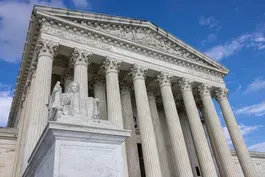
How synthetic braids may pose health risks for Black women
Clip: 4/19/2025 | 7m 18sVideo has Closed Captions
How synthetic braiding hair may be putting Black women’s health in jeopardy
For years, Black women have used synthetic braids to help style their hair. But a recent study by Consumer Reports found that these fake hair strands can contain dangerous chemicals that pose a health threat. Ali Rogin reports on the history of braiding in Black culture and speaks with Adana Llanos, co-leader of the Cancer Population Science Program at Columbia University, to learn more.
Problems with Closed Captions? Closed Captioning Feedback
Problems with Closed Captions? Closed Captioning Feedback
Major corporate funding for the PBS News Hour is provided by BDO, BNSF, Consumer Cellular, American Cruise Lines, and Raymond James. Funding for the PBS NewsHour Weekend is provided by...

How synthetic braids may pose health risks for Black women
Clip: 4/19/2025 | 7m 18sVideo has Closed Captions
For years, Black women have used synthetic braids to help style their hair. But a recent study by Consumer Reports found that these fake hair strands can contain dangerous chemicals that pose a health threat. Ali Rogin reports on the history of braiding in Black culture and speaks with Adana Llanos, co-leader of the Cancer Population Science Program at Columbia University, to learn more.
Problems with Closed Captions? Closed Captioning Feedback
How to Watch PBS News Hour
PBS News Hour is available to stream on pbs.org and the free PBS App, available on iPhone, Apple TV, Android TV, Android smartphones, Amazon Fire TV, Amazon Fire Tablet, Roku, Samsung Smart TV, and Vizio.
Providing Support for PBS.org
Learn Moreabout PBS online sponsorshipJOHN YANG: For years, black women have used synthetic braids to help style their hair.
But a recent study by Consumer Reports found that these fake hair strands can contain dangerous chemicals that pose a health threat.
Ali Rogin begins our report with a look at the rich history of braiding in black culture.
ALI ROGIN (voice-over): Interweaving pieces of hair into styles like cornrows and twists began thousands of years ago.
In Africa, men and women would ravel intricately braided patterns on their heads, laced with gold adornments and hair extensions, these designs were a marker of class and age.
But by the 17th century, enslaved Africans would be forced to shave their heads, censoring their identity.
Only some were allowed to braid their hair.
Then, in the 20th century, as African Americans gained their freedom and status, some chose Eurocentric hairstyles, which meant flattening their hair and its natural curls.
NICOLE JENKINS, Howard University: When folks gained their freedom from enslavement, they chose to wear Eurocentric hairstyles as a means of safety, for a lot of reasons, assimilating to whiteness or Eurocentric standards of beauty could mean a job.
ALI ROGIN (voice-over): Dr. Nicole Jenkins is an assistant professor of sociology and criminology at Howard University and a visiting professor at Harvard.
She says the civil rights era in the 1950s and 60s triggered a return for many black Americans to hairstyles that celebrated their African heritage.
NICOLE JENKINS: This was a way for folks in the black community to celebrate their blackness rather than try to assimilate or hide it.
ALI ROGIN (voice-over): On popular shows like Soul Train, black Americans rocked a fro.
Others opted for braids, a classic look that exploded again in the late 90s and early 2000s.
R and B star Alicia Keys made them her aesthetic.
And in recent years, Beyonce would popularize Lemonade Braids, a new spin on the classic cornrow style of braids, named after the singer's 2016 album, Lemonade.
But now a new report is raising concerns about popular synthetic hair used in braided styles.
NICOLE JENKINS: Now this consumer report is coming out and saying that there are carcinogens within the braiding hair.
Right.
Which is the antithesis of what many black women are trying to do in the promotion of their hair health.
It has the ability to impact the natural hair movement and the hair industry quite a bit.
ALI ROGIN: Dr. Adana Llanos is an associate professor of epidemiology and co-leader of the Cancer Population Science program at Columbia University.
Dr. Llanos, thank you so much for joining us.
The Consumer Reports investigation found dangerous levels of these chemicals in some of the most popular synthetic braiding hair brands.
What do we know about the risks, the health risks of exposure to these toxins?
DR. ADANA LLANOS, Columbia University: Yeah.
So the recent tests by Consumer Reports revealed that these synthetic braiding hair products can contain a variety of toxic chemicals, including carcinogens, benzene and methylene chloride, as well as heavy metals like lead and cadmium.
And so this is a concern for consumers who use these products regularly and keep them on their hair long term.
ALI ROGIN: Certainly many consumer products have trace levels of toxic chemicals that you wouldn't want in big amounts.
But the notion that, you know, you have the braids on your head for a very long time, does that have an impact on the risks that may be associated with using these products long term?
ADANA LLANOS: Yeah, absolutely.
People that use these synthetic hair braiding products keep braids in their hair for six weeks, maybe eight weeks.
So if you think about it, these small doses of toxic chemical exposures really are long term sort of doses, which can be associated with increased risk of many outcomes.
ALI ROGIN: What should black women be aware of when purchasing and using these.
These types of synthetic hair?
ADANA LLANOS: I think the most important thing for black women and I think all consumers is to be aware of the products that they're using and to be aware of the potential harms from chemicals in those products.
ALI ROGIN: What is significant about the scale of the tests that have been done on hair braiding products so far and what still needs to be done and tested on?
ADANA LLANOS: I have a colleague at Silent Spring, Dr. Alicia Franklin, who's actually testing these same products.
We need more studies like this on these products and many other products that are widely available on the market to understand what these exposures are.
And in reality, we don't have long term studies that can tell us exactly what are the health hazards associated with using these products or what are the health hazards associated with long term exposures to the chemicals in these specific products.
ALI ROGIN: In terms of regulation, the FDA proposed a ban on formaldehyde in hair straightening products after studies revealed that causes cancer.
That ban has not yet gone into effect.
But based on what we've seen the FDA do with regard to previous products, how do you think the agency is going to respond to this kind of study?
ADANA LLANOS: You know, it's hard to say what the FDA will do in response to this study and other studies that my colleagues and I are actively conducting and, you know, data that we will be reporting out soon.
But all I can say is I believe that the FDA should regulate synthetic braiding products and many other consumer products that we know contain carcinogens and other toxic chemicals.
ALI ROGIN: Well, and to this point, studies have consistently shown that the.
There are fewer low hazard products available in the personal care category for black women than on the personal care market as a whole.
So are there deeper issues that are at play here?
ADANA LLANOS: Yes, I would say so.
And I think that's a really important point to raise.
I'm aware of a variety of brands and manufacturers that are moving towards providing, you know, cleaner, less toxic, whatever you want to call safer.
And I put that in quotes.
And so I think as these manufacturers recognize that consumers, including black women, are interested in products that are less toxic to their health.
I think it's up to these manufacturers to do the right thing and make better products.
And in addition to the manufacturers, I think the FDA needs to regulate products more widely so that we aren't concerned about the products that are widely available in our stores.
ALI ROGIN: Dr. Adana Llanos with Columbia University, thank you so much for joining us.
ADANA LLANOS: Thanks for having me.
News Wrap: Russia, Ukraine swap POWs in temporary ceasefire
Video has Closed Captions
News Wrap: Russia and Ukraine swap POWs amid temporary ceasefire (3m 12s)
Retired firefighter looks back at tragedy of OKC bombing
Video has Closed Captions
Retired firefighter looks back at tragedy of Oklahoma City bombing, 30 years later (6m 37s)
Supreme Court pauses deportations of more Venezuelans
Video has Closed Captions
Supreme Court temporarily blocks Trump from deporting more Venezuelan migrants (6m 2s)
Providing Support for PBS.org
Learn Moreabout PBS online sponsorshipSupport for PBS provided by:
Major corporate funding for the PBS News Hour is provided by BDO, BNSF, Consumer Cellular, American Cruise Lines, and Raymond James. Funding for the PBS NewsHour Weekend is provided by...














